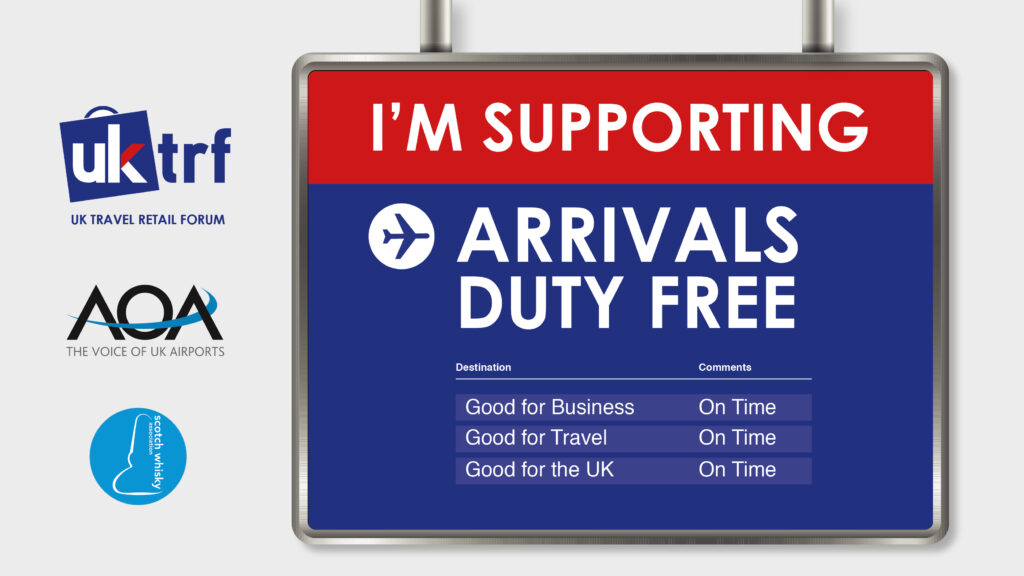Duty-Free on Arrival
Since Brexit, UKTRF has been leading the industry-wide campaign for the introduction of duty-free on arrival stores in the UK.
The decision to reinstate duty-free shopping and increase inbound personal allowances upon the UK’s departure from the European Union has proven extremely popular with consumers. In our first year outside of the EU, UKTRF’s retail members have reported an estimated 45% increase in sales of duty-free items by UK passengers abroad in the first year alone.
However, UK businesses and airports have received no benefit from this change, as without duty-free on arrival, passengers are only incentivised to spend their increased allowances abroad at their point of departure. The policy of duty-free on arrival would repatriate these sales and ensure UK businesses are the beneficiaries of the post-Brexit duty-free system.
In recent times, the policy has become the unified ask of the travel retail industry, and has the support of other industry associations, including the Airport Operators Association (AOA) and the Scotch Whisky Association.
Non-aeronautical forms of revenue such as duty-free and other retail sales are a crucial financial support for many airports and travel hubs across the UK. They are also a vital sales channel for many British businesses. With the global cost of living crisis worsening, UKTRF members fear that there will be more difficult months and years ahead. To help the sector return to self-sufficiency and support wider economic growth, the industry is urging the government to consider implementing duty- free on arrival stores at all UK airports, international train stations and ferry terminals.
Other benefits of the policy include:
Increasing international competitiveness of UK airports: 65 countries currently have arrivals duty-free stores in place, including Asia, the Middle East and Australasia, and several non-EU countries in the EEA and Eastern Europe. The EU’s DG TAXUD recently launched a review of travel and tourism taxation to this end, and we understand there is significant interest in the policy. Permitting arrivals duty-free in the UK will therefore level the playing field and increase the UK’s global competitiveness.
A sustainable and significant new contribution to revenues: Independent research from York Aviation has found that the introduction of arrivals duty-free would increase average spend per passenger by 20-30 per cent – money which can be reinvested into UK travel hubs to improve facilities and connectivity, and help service debt accrued during the pandemic.
Convenient for consumers: Recent polling by Yonder Consulting found 45% of travellers regard carrying duty-free items back to the UK on their flight as an inconvenience. Arrivals duty-free stores will give travellers the option to purchase at the end of the journey, providing them with a more seamless travel experience.
Levelling Up – job creation and improving regional connectivity: The creation of new retail areas at UK airports will trigger significant capital expenditure for building works as infrastructure is adapted to take advantage of the new opportunity – resulting in further local economic investment. The increase in sales can be reinvested in new routes, improving passenger numbers and connectivity to regional areas.
Popular with voters: When asked, 55% of people agreed that UK citizens should be allowed to use their duty-free allowance within the UK, and when informed that arrivals duty-free stores were in place in 65 other countries, a further 36% said that made them more likely to support their introduction in the UK. Only 8% of all those asked were opposed to the policy.
Cost neutral for government: In the same polling, nearly three-quarters (72%) of people said did not expect the introduction of arrivals stores to change their purchasing of alcoholic spirits domestically. The impact of arrivals duty-free stores on high street sales and UK tax revenues would, therefore, be nominal. In fact, York Aviation’s research states that arrivals duty-free has the potential to increase UK sales of duty-free products by up to £100 million per year. The research calculates that an increase in sales of this volume, coupled with the income tax collected from the jobs created, could generate an additional £50 million in tax revenues for the government.
Easy to implement: Arrivals duty-free stores can be implemented using only secondary legislation. The stores will be situated before customs, enabling UK Border Force to ensure compliance with existing duty-free allowances (which will not be changed). There will be no additional regulatory burdens, and the travel retail industry is committed to working with HMRC and Treasury to remind inbound passengers of their allowances.
Showcasing the best of UK consumer goods: The increased availability and visibility of duty-free products provides an opportunity to showcase the best of UK consumer goods, such as Scottish whisky and other high-quality spirits. The UK’s spirits industry has long been at a competitive disadvantage as a result of high tax burdens. As travel retail is an essential market for many spirits producers, the introduction of arrivals duty-free stores will provide a crucial source of revenue.

